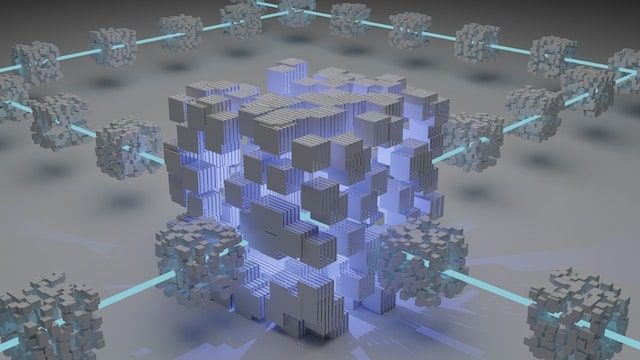Decentralization is a fundamental aspect of blockchain technology, driving its development and setting it apart from other systems. This article explores the concept of decentralization, its importance, advantages, challenges, and implementation across different blockchain platforms.
By distributing authority and decision-making, blockchain networks eliminate the need for a central governing body, allowing for transparent and secure peer-to-peer transactions. However, decentralization can present scalability issues and governance disputes as potential hurdles.
This article examines how various blockchains address decentralization, highlighting the trade-offs each approach entails. It explores well-known platforms like Bitcoin and Ethereum, as well as emerging alternatives.
Additionally, the article discusses the future implications of decentralization in sectors such as finance, supply chain management, and governance.
In summary, this article provides a comprehensive exploration of the pivotal role decentralization plays in the realm of blockchain technology.
The Definition of Decentralization
Decentralization refers to the distribution of power and authority among multiple participants in a network or system. In the context of blockchain technology, decentralization specifically means that there is no central authority or intermediary controlling the operations of the network. Instead, the power is distributed among the participants, known as nodes, who collectively maintain and validate the transactions and data on the blockchain.
Decentralization offers several benefits to blockchain networks. Firstly, it eliminates the need for a central authority, reducing the risk of a single point of failure and making the system more resilient to attacks or censorship attempts. Secondly, it promotes transparency and trust as all participants can independently access and verify the public ledger. Additionally, decentralization fosters innovation and competition, as anyone can join the network and contribute to its development without requiring permission.
However, decentralization also presents challenges. The distributed nature of blockchain networks can result in slower transaction speeds compared to centralized systems. Moreover, reaching consensus among multiple participants can be complex and resource-intensive. Furthermore, ensuring the security and integrity of the network becomes a shared responsibility, requiring active engagement from participants in maintaining the system.
Benefits of Decentralization in Blockchain
Decentralization in blockchain offers several advantages. One key benefit is the removal of a central authority, resulting in increased resilience, transparency, and innovation. Instead of power and control being concentrated in a single entity, decentralization distributes them across a network of nodes.
Firstly, decentralized systems exhibit greater resilience to failures and attacks. Without a single point of failure, it becomes more difficult for malicious actors to disrupt the network. Even if some nodes go offline, the blockchain can continue to function, ensuring its availability and reliability.
Secondly, decentralization enhances transparency. All transactions and information on a decentralized blockchain are visible to all participants, creating a transparent and auditable record. This fosters trust and accountability, as it becomes nearly impossible to manipulate or alter data without detection.
Lastly, decentralization promotes innovation. With no central authority controlling the system, anyone can participate and contribute to the blockchain’s development. This encourages experimentation and the creation of new applications, leading to a vibrant ecosystem of decentralized applications (dApps) and smart contracts.
Challenges in Achieving Decentralization
Decentralization in blockchain technology poses several challenges that require attention and resolution. While decentralization is a fundamental aspect of blockchain, effectively implementing it can be a complex undertaking. The following are three key challenges in achieving decentralization:
1. Scalability
Scaling a decentralized blockchain network to handle a large volume of transactions is a significant challenge. As more participants join the network, the demand for increased processing power and storage capacity grows. However, scaling a blockchain while maintaining decentralization can be difficult due to the consensus mechanisms and the requirement for all nodes to validate and store the entire transaction history.
2. Governance
Decentralized blockchains often encounter challenges in decision-making and governance. Without a central authority, reaching consensus on protocol upgrades, resolving disputes, and enforcing rules can become a time-consuming and contentious process. Developing effective mechanisms for decentralized governance is crucial to ensure the stability and evolution of the blockchain network.
3. Security
Decentralized blockchains are vulnerable to security threats. As the number of nodes increases, so does the potential attack surface. Concerns such as Sybil attacks, where an attacker controls multiple nodes to manipulate the network, and 51% attacks, where a single entity gains majority control over the network, are significant. Implementing robust security measures to prevent these attacks and protect user data is essential for maintaining trust in the blockchain ecosystem.
Addressing these challenges necessitates innovative solutions and ongoing research and development. Overcoming these obstacles will be pivotal in realizing the full potential of decentralized blockchain technology.
Decentralization Approaches in Different Blockchains
Decentralization approaches in different blockchains can be categorized into three main types: permissionless, permissioned, and hybrid.
Permissionless blockchains, such as Bitcoin and Ethereum, allow anyone to participate in the network without requiring permission. These blockchains use a consensus mechanism, typically Proof of Work (PoW), to validate transactions and secure the network. By allowing anyone to participate, permissionless blockchains ensure a high level of decentralization, as no single entity has control over the network.
On the other hand, permissioned blockchains restrict participation to a predefined set of trusted entities. These blockchains are often used in enterprise settings, where privacy and scalability are important. By granting permission to specific entities, permissioned blockchains can achieve faster transaction speeds and greater efficiency. However, they sacrifice some degree of decentralization as the network is controlled by a limited number of participants.
Hybrid blockchains combine elements of both permissionless and permissioned blockchains. They allow for public participation while also providing certain permissions to specific entities. This approach offers a balance between openness and control, allowing for a wide range of use cases.
Future Implications of Decentralization in Blockchain
The future implications of decentralization in blockchain technology are significant and far-reaching.
Decentralization in blockchain has several key future implications:
- Enhanced Security: Decentralization ensures that data is distributed across multiple nodes or computers, making it challenging for hackers to compromise the system. This increased security is crucial in industries such as finance, healthcare, and supply chain management, where data protection is paramount.
- Increased Transparency: Blockchain’s decentralized nature allows for transparent and immutable records. This transparency fosters trust and accountability in various sectors. For example, in supply chain management, blockchain enables consumers to verify the authenticity and origin of products, reducing the prevalence of counterfeit goods.
- Disintermediation and Cost Reduction: Blockchain has the potential to eliminate intermediaries, such as banks or brokers, from various processes. This can lead to cost savings for businesses and consumers. For instance, blockchain-based smart contracts automate and streamline transactions, eliminating the need for intermediaries and reducing associated fees.
As blockchain continues to evolve, these future implications of decentralization have the potential to revolutionize industries, improve efficiency, and empower individuals in the digital age.
The future of blockchain holds promise, ushering in an era of trust, transparency, and cost-effectiveness.
Frequently Asked Questions
How Does Decentralization in Blockchain Technology Differ From Traditional Centralized Systems?
Decentralization in blockchain technology differs from traditional centralized systems by eliminating the need for a single authority or intermediary. Instead, control and decision-making power are distributed among multiple participants in the network. This approach enhances transparency, security, and resilience.
Can You Provide Some Real-World Examples of the Benefits of Decentralization in Blockchain?
Decentralization in blockchain technology provides several real-world benefits. These benefits include increased transparency, enhanced security, reduced costs, and improved efficiency. These advantages arise from the removal of a central authority and the distributed nature of blockchain networks.
The benefits of decentralization in blockchain technology can be seen in various industries. For example, in the financial sector, decentralized finance (DeFi) platforms allow users to access financial services without the need for intermediaries. This eliminates the need for traditional banks and financial institutions, reducing costs and providing greater financial inclusivity.
Another real-world example is supply chain management. By utilizing blockchain technology, supply chains can be decentralized, ensuring transparency and traceability of goods throughout the entire process. This reduces the risk of fraud and counterfeit products, ultimately benefiting businesses and consumers alike.
In the healthcare industry, decentralization in blockchain can improve data security and privacy. By storing medical records on a distributed ledger, patients have control over their own data, reducing the risk of unauthorized access and ensuring data integrity.
Furthermore, decentralization in blockchain technology has the potential to revolutionize the energy sector. Through the use of peer-to-peer energy trading platforms, individuals can directly buy and sell renewable energy, bypassing traditional energy providers. This not only promotes renewable energy adoption but also empowers individuals to take control of their energy consumption.
These real-world examples highlight the numerous benefits that decentralization brings to various sectors through the use of blockchain technology. From increased transparency and security to reduced costs and improved efficiency, decentralization has the potential to transform industries and empower individuals.
What Are Some Specific Technical Challenges That Arise in Achieving Decentralization in Blockchain?
Achieving decentralization in blockchain presents a range of technical challenges. These challenges encompass scalability, consensus mechanisms, network security, and governance. Scalability issues arise when there is an increase in the number of participants and transactions within the blockchain network. Consensus mechanisms play a crucial role in ensuring agreement among nodes. Network security and governance require the implementation of robust protocols to safeguard the integrity and reliability of the blockchain system. These challenges must be addressed effectively to achieve a truly decentralized blockchain network.
How Do Different Blockchains Approach Decentralization, and What Are the Key Differences Between Them?
Different blockchains employ various approaches to achieve decentralization, resulting in significant variations among them. These disparities primarily stem from differences in the consensus mechanism utilized, the level of participation required from network nodes, and the extent of control exerted by any central authority.
What Are the Potential Long-Term Implications of Widespread Decentralization in Blockchain Technology for Various Industries and Sectors?
The potential long-term implications of widespread decentralization in blockchain technology for various industries and sectors are significant. They include increased security, transparency, efficiency, and trust. This revolutionary technology has the potential to transform sectors such as finance, supply chain, healthcare, and voting systems. By promoting innovation and disrupting traditional centralized models, blockchain can bring about positive changes in these industries.
The benefits of widespread decentralization in blockchain technology are as follows:
- Increased Security: Blockchain’s decentralized nature makes it more resistant to hacking and fraud. The use of cryptographic techniques ensures the integrity and immutability of data, reducing the risk of unauthorized access and tampering.
- Enhanced Transparency: With blockchain, transactions and data are recorded on a public ledger that is accessible to all participants. This transparency fosters trust among stakeholders and reduces the need for intermediaries, resulting in more efficient processes.
- Improved Efficiency: By eliminating the need for intermediaries and streamlining processes, blockchain technology can significantly enhance efficiency in various industries. It enables real-time settlement, reduces paperwork, and automates complex tasks, leading to cost savings and faster transaction times.
- Trust and Accountability: Blockchain’s decentralized and transparent nature enhances trust among participants. It provides an immutable record of transactions, making it easier to verify and trace the origin of assets or goods. This can be particularly beneficial in supply chain management, where traceability and accountability are crucial.
Conclusion
Decentralization is a fundamental aspect of blockchain technology. It plays a crucial role in enhancing transparency, security, and resilience in peer-to-peer transactions. By removing the need for a central authority, decentralization allows for greater trust and eliminates the risk of a single point of failure.
The benefits of decentralization in blockchain technology are significant. It enables increased transparency, as all transactions are recorded on a distributed ledger that is accessible to all participants. This transparency helps to prevent fraud and ensures the integrity of the data. Additionally, decentralization enhances security by making it difficult for malicious actors to manipulate or tamper with the system.
Another advantage of decentralization is its ability to provide resilience. In a decentralized network, there is no single point of failure that can disrupt the entire system. This makes blockchain technology more robust and resistant to attacks or failures.
However, decentralization also presents challenges. Scalability is one such challenge, as the distributed nature of blockchain can result in slower transaction speeds compared to centralized systems. Additionally, governance disputes may arise when multiple parties are involved in decision-making processes.
Different blockchain platforms have adopted unique approaches to achieve decentralization. Some use consensus mechanisms like Proof of Work or Proof of Stake, while others implement sharding or sidechains to improve scalability. These approaches reflect the ongoing efforts to balance the benefits and challenges of decentralization.
The implications of decentralization in sectors such as finance, supply chain management, and governance are promising. Blockchain technology has the potential to revolutionize these sectors by providing increased efficiency, transparency, and trust. For example, decentralized finance (DeFi) platforms enable peer-to-peer lending, trading, and investment without the need for traditional intermediaries.
As blockchain technology continues to advance, decentralization will remain a key principle shaping its future applications and impact. It offers a new paradigm for trust and collaboration, paving the way for innovative solutions in various industries. The potential benefits of decentralization make it a fundamental aspect of blockchain technology that will continue to drive its adoption and development.





Comments (No)